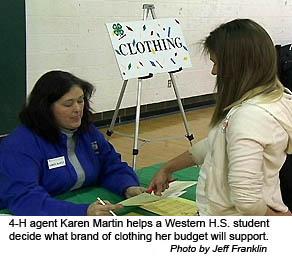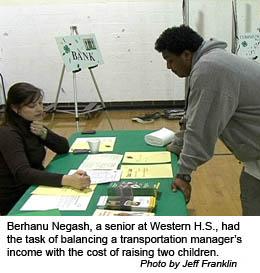Welcome to the Real World
Welcome to the Real World

A lawyer reluctantly returns his purchases to a high-end clothing retailer because he can’t seem to make ends meet. The woman who accepts his exchange asks in surprise, “Where have you spent all your money?”
“On a car and a house,” he says. “I gotta have the best.” And then he chuckles.
He chuckles because he’s not really a lawyer – yet. And the woman who accepted his “returns” really isn’t a sales clerk. He’s a student at Western High School in Louisville and she’s a University of Kentucky Cooperative Extension agent in Jefferson County. They’re both participants in The Reality Store.
Offered through 4-H, The Reality Store is designed to prepare high school juniors and seniors for the realities of life on their own. Some students are planning to go to college, some will enter the work force after their high school graduation and others are not sure yet which road to take. Lessons learned in The Reality Store can be life-changing.
“We’re hoping this is going to help them make wiser decisions, think about budgeting, think about their money,” said Kelly McDonough, Jefferson County 4-H and youth development agent. “It’s a really good program.”
In preparation for the event, McDonough and fellow 4-H and Youth Development Agent Chanda Hall visited the students at Western High School a few weeks ago. During a class drawing, each student was assigned an arbitrary career that could be anything from a lawyer to a gas station attendant, and were told the corresponding wage or salary. They also drew for the number of children they had to support.
Hall and McDonough taught a class on taxes and keeping a checkbook. The students’ after-tax income was then recorded in their checkbooks to ready them for their trip to The Reality Store, which in this instance was set up in the small gymnasium at Western. There, moving around a ring of tables identified with placards touting a variety of expenses such as communications, housing, groceries or medical insurance, they spent their “wages” on life’s necessities.
It was an eye-opening experience for many of the students.
A student who dropped by Hall’s booth was looking for a second job to help make ends meet. In the world of The Reality Store, she is a gas station attendant. Hall examined her “checkbook” to see if there was any way the student could cut back on her spending. If she couldn’t, she might have to clean houses as a second job. Hall focused in on a truck the girl just “bought.”
“What’s this? Why do you need a truck?”
“I just wanted it,” the student said.
“What’s the difference between ‘need’ and ‘want’?” Hall asked. “The question is, do you need this truck?”
The answer was obviously no, because the student reluctantly went back to the Transportation booth and turned her truck in for a TARC, or bus, pass. She may have traded the freedom of having her own vehicle for the scheduling limitations of public transportation, but she no longer has to work two jobs to make ends meet. She also learned a valuable lesson about what is necessary and what isn’t. Karen Martin, a 4-H and youth development agent, was manning the clothing booth where students had to decide whether to buy from upscale, moderately priced or discount retailers. She laughed when she recounted how one particular student was reluctant to spend the required amount on clothing for both of her children.
Karen Martin, a 4-H and youth development agent, was manning the clothing booth where students had to decide whether to buy from upscale, moderately priced or discount retailers. She laughed when she recounted how one particular student was reluctant to spend the required amount on clothing for both of her children.
“The student said, ‘Well, my one kid can wear hand-me-downs.’ I looked at her sheet and said, ‘They’re twins! They’ve both have to wear clothes at the same time,’” Martin said.
“I think a lot of them have noticed that if they’re not going to finish high school or that’s the only step they’re going to take, that they’re going to have to get some type of certification or go on to college,” McDonough said.
Berhanu Negash, a senior at Western High School, had the task of balancing a transportation manager’s income with two young children at home.  “I bought insurance. I rented an apartment, because I couldn’t buy a house because I don’t have that much income,” he said. “I’m not having a car, so I’m going to have to TARC it. And I’m going to have to do some child care.”
“I bought insurance. I rented an apartment, because I couldn’t buy a house because I don’t have that much income,” he said. “I’m not having a car, so I’m going to have to TARC it. And I’m going to have to do some child care.”
He had most of the booths to visit yet, but Negash was confident.
“I’m going to make it, because I know how to manage my money,” he said.
Still, he said he’s learned a lesson from the experience.
“I’ve got to go get a good education, I guess,” he said.
The Reality Store throws one more surprise at the students. After they’ve spent their money on the expected items such as utilities and housing, there’s one more booth they have to visit. That booth is “Chance,” which illustrates those good and bad surprises life throws at everyone. After drawing a card, they may find that they’ve won $25 in a lottery or that their car needs repaired. One student drew a $75 citation for speeding on the interstate.
“Can I try again?” she asked, reaching for another card.
The answer was no. Life doesn’t work that way.
Senior Jamaine Primm learned a valuable lesson during his visit to The Reality Store.
“I’m going to start saving now,” he said, “and hopefully one day I can invest. But until then I’m going to be more careful with my money.”